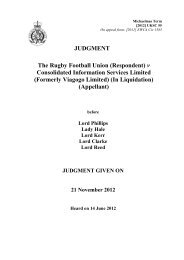JUDGMENT ZH (Tanzania) - The Supreme Court
JUDGMENT ZH (Tanzania) - The Supreme Court
JUDGMENT ZH (Tanzania) - The Supreme Court
Create successful ePaper yourself
Turn your PDF publications into a flip-book with our unique Google optimized e-Paper software.
<strong>JUDGMENT</strong><br />
Hilary Term<br />
[2011] UKSC 4<br />
On appeal from: [2009] EWCA Civ 691<br />
<strong>ZH</strong> (<strong>Tanzania</strong>) (FC) (Appellant) v Secretary of<br />
State for the Home Department (Respondent)<br />
before<br />
Lord Hope, Deputy President<br />
Lady Hale<br />
Lord Brown<br />
Lord Mance<br />
Lord Kerr<br />
<strong>JUDGMENT</strong> GIVEN ON<br />
1 February 2011<br />
Heard on 9 and 10 November 2010
Appellant Respondent<br />
Manjit Gill QC Monica Carss-Frisk QC<br />
Benjamin Hawkin Susan Chan<br />
(Instructed by Raffles<br />
Haig Solicitors)<br />
Interveners (for the<br />
Appellant’s children)<br />
Joanna Dodson QC<br />
Edward Nicholson<br />
(Instructed by Raffles<br />
Haig Solicitors)<br />
(Instructed by Treasury<br />
Solicitors)
LADY HALE (with whom Lord Brown and Lord Mance agree)<br />
1. <strong>The</strong> over-arching issue in this case is the weight to be given to the best<br />
interests of children who are affected by the decision to remove or deport one or<br />
both of their parents from this country. Within this, however, is a much more<br />
specific question: in what circumstances is it permissible to remove or deport a<br />
non-citizen parent where the effect will be that a child who is a citizen of the<br />
United Kingdom will also have to leave? <strong>The</strong>re is, of course, no power to remove<br />
or deport a person who is a United Kingdom citizen: see Immigration Act 1971,<br />
section 3(5) and (6). <strong>The</strong>y have a right of abode in this country, which means that<br />
they are free to live in, and to come and go into and from the United Kingdom<br />
without let or hindrance: see 1971 Act, sections 1 and 2. <strong>The</strong> consistent stance of<br />
the Secretary of State is that UK citizens are not compulsorily removed from this<br />
country (eg Phil Woolas, Hansard, Written Answers, 15 June 2009). However if a<br />
non-citizen parent is compulsorily removed and agrees to take her children with<br />
her, the effect is that the children have little or no choice in the matter. <strong>The</strong>re is no<br />
machinery for consulting them or giving independent consideration to their views.<br />
<strong>The</strong> facts<br />
2. <strong>The</strong> facts of this case are a good illustration of how these issues can arise.<br />
<strong>The</strong> mother is a national of <strong>Tanzania</strong> who arrived here in December 1995 at the<br />
age of 20. She made three unsuccessful claims for asylum, one in her own identity<br />
and two in false identities. In 1997 she met and formed a relationship with a<br />
British citizen. <strong>The</strong>y have two children, a daughter, T, born in 1998 (who is now<br />
12 years old) and a son, J, born in 2001 (who is now nine). <strong>The</strong> children are both<br />
British citizens, having been born here to parents, one of whom is a British citizen.<br />
<strong>The</strong>y have lived here with their mother all their lives, nearly all of the time at the<br />
same address. <strong>The</strong>y attend local schools.<br />
3. <strong>The</strong>ir parents separated in 2005 but their father continues to see them<br />
regularly, visiting approximately twice a month for 4 to 5 days at a time. In 2007<br />
he was diagnosed with HIV. He lives on disability living allowance with his<br />
parents and his wife and is reported to drink a great deal. <strong>The</strong> tribunal nevertheless<br />
thought that there would not “necessarily be any particular practical difficulties” if<br />
the children were to go to live with him. <strong>The</strong> <strong>Court</strong> of Appeal very sensibly<br />
considered this “open to criticism as having no rational basis”. Nevertheless, they<br />
upheld the tribunal’s finding that the children could reasonably be expected to<br />
follow their mother to <strong>Tanzania</strong>: [2009] EWCA Civ 691, para 27. <strong>The</strong>y also<br />
declined to hold that there was no evidence to support the tribunal’s finding that<br />
Page 2
the father would be able to visit them in <strong>Tanzania</strong>, despite his fragile health and<br />
limited means: para 32.<br />
4. As it happens, this <strong>Court</strong> has seen another illustration of how these issues<br />
may arise, in the case of R (WL) (Congo) v Secretary of State for the Home<br />
Department [2010] 1 WLR 2168 (<strong>Supreme</strong> <strong>Court</strong> judgment pending). Both father<br />
and mother are citizens of the Democratic Republic of Congo. <strong>The</strong>ir child,<br />
however, is a British citizen. <strong>The</strong> Secretary of State intends to deport the father<br />
under section 3(5) of the 1971 Act and also served notice of intention to deport<br />
both mother and child. <strong>The</strong>re is power to deport non-citizen family members of<br />
those deported under section 3(5) but there is no power to deport citizens under<br />
that or any other provision of the 1971 Act. It is easy to see how a mother served<br />
with such a notice might think that there was such a power and that she had no<br />
choice. Fortunately, it appears that the notice was not followed up with an actual<br />
decision to deport in that case.<br />
<strong>The</strong>se proceedings<br />
5. This mother’s immigration history has rightly been described as<br />
“appalling”. She made a claim for asylum on arrival in her own name which was<br />
refused in 1997 and her appeal was dismissed in 1998, shortly after the birth of her<br />
daughter. She then made two further asylum applications, pretending to be a<br />
Somali, both of which were refused. In 2001, shortly before the birth of her son,<br />
she made a human rights application, claiming that her removal would be in breach<br />
of article 8 of the European Convention on Human Rights. This was refused in<br />
2004 and her appeal was dismissed later that year. Also in 2004 she and the<br />
children applied for leave to remain under the “one-off family concession” which<br />
was then in force. This was refused in 2006 because of her fraudulent asylum<br />
claims. Meanwhile in 2005 she applied under a different policy known as the<br />
“seven year child concession”. This too was refused, for similar reasons, later in<br />
2006 and her attempts to have this judicially reviewed were unsuccessful.<br />
6. After the father’s diagnosis in 2007, fresh representations were made. <strong>The</strong><br />
Secretary of State accepted these as a fresh claim but rejected it early in 2008. <strong>The</strong><br />
mother’s appeal was dismissed in March 2008. However an application for<br />
reconsideration was successful. In May 2008, Senior Immigration Judge<br />
McGeachy held that the immigration judge had not considered the relationship<br />
between the children and their father (it being admitted that there was no basis on<br />
which he could have found that they could live here with him), the fact that they<br />
had been born in Britain and were then aged nine and seven and were British. It<br />
was a material error of law for the immigration judge not to have taken into<br />
account the rights of the children and the effect of the mother’s removal upon<br />
them.<br />
Page 3
7. Nevertheless at the second stage of the reconsideration, the tribunal, having<br />
heard the evidence, dismissed the appeal: Appeal Number IA/01284/2008. <strong>The</strong>y<br />
found that there was family life between the mother and the children and between<br />
the father and the children, although not between the parents, and also that the<br />
mother had built up a substantial private life in this country (para 5.3). Removal to<br />
<strong>Tanzania</strong>, if the children accompanied the Appellant, would substantially interfere<br />
with the relationship with their father; staying behind would substantially interfere<br />
with the relationship with their mother (para 5.4). Removing the mother would be<br />
in accordance with the law for the purpose of protecting the rights and freedoms of<br />
others. <strong>The</strong> only question was whether it would be proportionate (para 5.5).<br />
8. <strong>The</strong> Tribunal found the mother to be seriously lacking in credibility. She<br />
had had the children knowing that her immigration status was precarious. Having<br />
her second child was “demonstrably irresponsible” (para 5.8). However, the<br />
children were innocent of their parents’ shortcomings (para 5.9). <strong>The</strong> parents now<br />
had to choose what would be best for their children: “We do not consider that it<br />
can be regarded as unreasonable for the respondent’s decision to have that effect,<br />
because the eventual need to take such a decision must have been apparent to them<br />
ever since they began their relationship and decided to have children together.”<br />
(para 5.10).<br />
9. <strong>The</strong> Tribunal found it a “distinct and very real possibility” that the children<br />
might remain here with their father (para 5.11). This might motivate him to<br />
overcome his difficulties. People with HIV can lead ordinary lives. <strong>The</strong> daughter<br />
was of an age when many African children were separated from their parents and<br />
sent to boarding schools. <strong>The</strong> son, had he been a Muslim, would have been<br />
regarded as old enough to live with his father rather than his mother. Hence the<br />
tribunal could not see “any particular practical difficulties” if the children were to<br />
go and live with their father (para 5.15).<br />
10. Equally, it would be “a very valid decision” for the children to go and live<br />
with their mother in <strong>Tanzania</strong> (para 5.16). It is not an uncivilised or an inherently<br />
dangerous place. <strong>The</strong>ir mother must have told them about it. <strong>The</strong>re were no<br />
reasons why their father should not from time to time travel to see the children<br />
there. <strong>The</strong>y did not accept that either his HIV status or his financial circumstances<br />
were an obstacle. Looking at the circumstances in the round, therefore, “neither of<br />
the potential outcomes of the appellant’s removal which we have outlined above<br />
would represent such an interference with the family life of the children, or either<br />
of them, with either their mother on the one hand or their father on the other as to<br />
be disproportionate, again having regard to the importance of the removal of the<br />
appellant in pursuance of the system of immigration control in this country” (para<br />
5.20). <strong>The</strong>y had earlier said that this was “of very great importance and<br />
considerable weight must be placed upon it” (para 5.19).<br />
Page 4
11. Permission to appeal was initially refused on the basis that, even if the<br />
Tribunal had been wrong to think that the children could stay here with their<br />
father, they could live in <strong>Tanzania</strong> with their mother. Ward LJ eventually gave<br />
permission to appeal because he was troubled about the effect of their leaving<br />
upon their relationship with their father: “how are we to approach the family rights<br />
of a broken family like this?” Before the <strong>Court</strong> of Appeal, however, it was argued<br />
that the British citizenship of the children was a “trump card” preventing the<br />
removal of their mother. This was rejected as inconsistent with the authorities, and<br />
in particular with the principle that there is no “hard-edged or bright-line rule”,<br />
which was enunciated by Lord Bingham of Cornhill in EB (Kosovo) v Secretary of<br />
State for the Home Department [2008] UKHL 41, [2009] 1 AC 1159, and is<br />
quoted in full at para 15 below.<br />
12. Mr Manjit Gill QC, on behalf of the appellant mother, does not argue in this<br />
<strong>Court</strong> that the citizenship of the children should be dispositive in every case. But<br />
he does argue that insufficient weight is given to the welfare of all children<br />
affected by decisions to remove their parents and in particular to the welfare of<br />
children who are British citizens. This is incompatible with their right to respect<br />
for their family and private lives, considered in the light of the obligations of the<br />
United Kingdom under the United Nations Convention on the Rights of the Child.<br />
Those obligations are now (at least partially) reflected in the duty of the Secretary<br />
of State under section 55 of the Borders, Citizenship and Immigration Act 2009.<br />
13. <strong>The</strong> Secretary of State now concedes that it would be disproportionate to<br />
remove the mother in the particular facts of this case. But she is understandably<br />
concerned about the general principles which the Border Agency and appellate<br />
authorities should apply.<br />
<strong>The</strong> domestic law<br />
14. This is the mother’s appeal on the ground that her removal will constitute a<br />
disproportionate interference with her right to respect for her private and family<br />
life, guaranteed by article 8 of the European Convention on Human Rights:<br />
“1. Everyone has the right to respect for his private and family life,<br />
his home and his correspondence.<br />
2. <strong>The</strong>re shall be no interference by a public authority with the<br />
exercise of this right except such as is in accordance with the law<br />
and is necessary in a democratic society in the interests of national<br />
security, public safety or the economic well-being of the country, for<br />
Page 5
the prevention of disorder or crime, for the protection of health or<br />
morals, or for the protection of the rights and freedoms of others.”<br />
However, in Beoku-Betts v Secretary of State for the Home Department [2008]<br />
UKHL 39, [2009] AC 115, the House of Lords held that both the Secretary of<br />
State and the immigration appellate authorities had to consider the rights to respect<br />
for their family life of all the family members who might be affected by the<br />
decision and not just those of the claimant or appellant in question. Lord Brown of<br />
Eaton-under-Heywood summarised the argument which the House accepted thus,<br />
at para 20:<br />
“Together these members enjoy a single family life and whether or<br />
not the removal would interfere disproportionately with it has to be<br />
looked at by reference to the family unit as a whole and the impact of<br />
removal upon each member. If overall the removal would be<br />
disproportionate, all affected family members are to be regarded as<br />
victims.”<br />
I added this footnote at para 4:<br />
“To insist that an appeal to the Asylum and Immigration Tribunal<br />
consider only the effect upon other family members as it affects the<br />
appellant, and that a judicial review brought by other family<br />
members considers only the effect upon the appellant as it affects<br />
them, is not only artificial and impracticable. It also risks missing the<br />
central point about family life, which is that the whole is greater than<br />
the sum of its individual parts. <strong>The</strong> right to respect for the family life<br />
of one necessarily encompasses the right to respect for the family life<br />
of others, normally a spouse or minor children, with whom that<br />
family life is enjoyed.”<br />
15. When dealing with the relevant principles in EB (Kosovo) v Secretary of<br />
State for the Home Department [2008] UKHL 41, [2009] AC 1159, Lord Bingham<br />
of Cornhill said this, at para 12:<br />
“Thus the appellate immigration authority must make its own<br />
judgment and that judgment will be strongly influenced by the<br />
particular facts and circumstances of the particular case. <strong>The</strong><br />
authority will, of course, take note of factors which have, or have<br />
not, weighed with the Strasbourg court. It will, for example,<br />
recognise that it will rarely be proportionate to uphold an order for<br />
Page 6
emoval of a spouse if there is a close and genuine bond with the<br />
other spouse and that spouse cannot reasonably be expected to<br />
follow the removed spouse to the country of removal, or if the effect<br />
of the order is to sever a genuine and subsisting relationship between<br />
parent and child. But cases will not ordinarily raise such stark<br />
choices, and there is in general no alternative to making a careful and<br />
informed evaluation of the facts of the particular case. <strong>The</strong> search for<br />
a hard-edged or bright-line rule to be applied in the generality of<br />
cases is incompatible with the difficult evaluative exercise which<br />
article 8 requires.”<br />
Thus, of particular importance is whether a spouse or, I would add, a child can<br />
reasonably be expected to follow the removed parent to the country of removal.<br />
16. Miss Monica Carss-Frisk QC, for the Secretary of State, was content with<br />
the way I put it in the Privy Council case of Naidike v Attorney-General of<br />
Trinidad and Tobago [2004] UKPC 49, [2005] 1 AC 538, at para 75:<br />
“<strong>The</strong> decision-maker has to balance the reason for the expulsion<br />
against the impact upon other family members, including any<br />
alternative means of preserving family ties. <strong>The</strong> reason for deporting<br />
may be comparatively weak, while the impact on the rest of the<br />
family, either of being left behind or of being forced to leave their<br />
own country, may be severe. On the other hand, the reason for<br />
deporting may be very strong, or it may be entirely reasonable to<br />
expect the other family members to leave with the person deported.”<br />
<strong>The</strong> Strasbourg cases<br />
17. <strong>The</strong>se questions tend to arise in two rather different sorts of case. <strong>The</strong> first<br />
relates to long-settled residents who have committed criminal offences (as it<br />
happens, this was the context of WL (Congo) v Secretary of State for the Home<br />
Department, above). In such cases, the principal legitimate aims pursued are the<br />
prevention of disorder and crime and the protection of the rights and freedoms of<br />
others. <strong>The</strong> Strasbourg court has identified a number of factors which have to be<br />
taken into account in conducting the proportionality exercise in this context. <strong>The</strong><br />
leading case is now Űner v <strong>The</strong> Netherlands (2007) 45 EHRR 421. <strong>The</strong> starting<br />
point is, of course, that states are entitled to control the entry of aliens into their<br />
territory and their residence there. Even if the alien has a very strong residence<br />
status and a high degree of integration he cannot be equated with a national.<br />
Article 8 does not give him an absolute right to remain. However, if expulsion will<br />
interfere with the right to respect for family life, it must be necessary in a<br />
Page 7
democratic society and proportionate to the legitimate aim pursued. At para 57, the<br />
Grand Chamber repeated the relevant factors which had first been enunciated in<br />
Boultif v Switzerland (2001) 33 EHRR 50 (numbers inserted):<br />
“[i] the nature and seriousness of the offence committed by the<br />
applicant;<br />
[ii] the length of the applicant’s stay in the country from which he<br />
or she is to be expelled;<br />
[iii] the time elapsed since the offence was committed and the<br />
applicant’s conduct during that period;<br />
[iv] the nationalities of the various persons concerned;<br />
[v] the applicant’s family situation, such as the length of the<br />
marriage, and other factors expressing the effectiveness of a couple’s<br />
family life;<br />
[vi] whether the spouse knew about the offence at the time when<br />
he or she entered into a family relationship;<br />
[vii] whether there are children of the marriage, and if so, their age;<br />
and<br />
[viii] the seriousness of the difficulties which the spouse is likely to<br />
encounter in the country to which the appellant is to be expelled.”<br />
Significantly for us, however, the Grand Chamber in Űner went on, in para 58, “to<br />
make explicit two criteria which may already be implicit” in the above (again,<br />
numbers inserted):<br />
“[ix] the best interests and well-being of the children, in particular<br />
the seriousness of the difficulties which any children of the applicant<br />
are likely to encounter in the country to which the applicant is to be<br />
expelled; and<br />
Page 8
[x] the solidity of social, cultural and family ties with the host<br />
country and with the country of destination”.<br />
<strong>The</strong> importance of these is reinforced in the recent case of Maslov v Austria [2009]<br />
INLR 47, para 75 where the Grand Chamber emphasised that “for a settled migrant<br />
who has lawfully spent all or the major part of his or her childhood and youth in<br />
the host country, very serious reasons are required to justify expulsion. This is all<br />
the more so where the person concerned committed the offences underlying the<br />
expulsion measure as a juvenile”.<br />
18. <strong>The</strong> second sort of case arises in the ordinary immigration context, where a<br />
person is to be removed because he or she has no right to be or remain in the<br />
country. Once again, the starting point is the right of all states to control the entry<br />
and residence of aliens. In these cases, the legitimate aim is likely to be the<br />
economic well-being of the country in controlling immigration, although the<br />
prevention of disorder and crime and the protection of the rights and freedoms of<br />
others may also be relevant. Factors (i), (iii), and (vi) identified in Boultif and Űner<br />
are not relevant when it comes to ordinary immigration cases, although the<br />
equivalent of (vi) for a spouse is whether family life was established knowing of<br />
the precariousness of the immigration situation.<br />
19. It was long ago established that mixed nationality couples have no right to<br />
set up home in whichever country they choose: see Abdulaziz v United Kingdom<br />
(1985) 7 EHRR 471. Once they have done so, however, the factors relevant to<br />
judging the proportionality of any interference with their right to respect for their<br />
family lives have quite recently been rehearsed in the case of Rodrigues da Silva,<br />
Hoogkamer v Netherlands (2007) 44 EHRR 729, at para 39:<br />
“. . . Article 8 does not entail a general obligation for a state to<br />
respect immigrants’ choice of the country of their residence and to<br />
authorise family reunion in its territory. Nevertheless, in a case<br />
which concerns family life as well as immigration, the extent of a<br />
state’s obligations to admit to its territory relatives of persons<br />
residing there will vary according to the particular circumstances of<br />
the person involved and the general interest [the reference is to Gűl v<br />
Switzerland (1996) 22 EHRR 93, at [38]]. Factors to be taken into<br />
account in this context are the extent to which family life is<br />
effectively ruptured, the extent of the ties in the contracting state,<br />
whether there are insurmountable obstacles in the way of the family<br />
living in the country of origin of one or more of them, whether there<br />
are factors of immigration control (eg a history of breaches of<br />
immigration law) or considerations of public order weighing in<br />
favour of exclusion [the reference is to Solomon v <strong>The</strong> Netherlands,<br />
Page 9
App No 44328/98, 5 September 2000]. Another important<br />
consideration will also be whether family life was created at a time<br />
when the persons involved were aware that the immigration status of<br />
one of them was such that the persistence of that family life within<br />
the host state would from the outset be precarious. <strong>The</strong> <strong>Court</strong> has<br />
previously held that where this is the case it is likely only to be in the<br />
most exceptional circumstances that the removal of the non-national<br />
family member will constitute a violation of Article 8 [the reference<br />
is to Mitchell v United Kingdom, App No 40447/98, 24 November<br />
1998; Ajayi v United Kingdom, App No 27663/95, 22 June 1999].”<br />
Despite the apparent severity of these words, the <strong>Court</strong> held that there had been a<br />
violation on the facts of the case. A Brazilian mother came to the Netherlands in<br />
1994 and set up home with a Dutch national without ever applying for a residence<br />
permit. In 1996 they had a daughter who became a Dutch national. In 1997 they<br />
split up and the daughter remained with her father. It was eventually confirmed by<br />
the Dutch courts that it was in her best interests to remain with her father and his<br />
family in the Netherlands even if this meant that she would have to be separated<br />
from her mother. In practice, however, her care was shared between the mother<br />
and the paternal grandparents. <strong>The</strong> court concluded at para 44 that,<br />
notwithstanding the mother’s “cavalier attitude to Dutch immigration rules”,<br />
“In view of the far reaching consequences which an expulsion would<br />
have on the responsibilities which the first applicant has as a mother,<br />
as well as on her family life with her young daughter, and taking into<br />
account that it is clearly in Rachael’s best interests for the first<br />
applicant to stay in the Netherlands, the <strong>Court</strong> considers that in the<br />
particular circumstances of the case the economic well-being of the<br />
country does not outweigh the applicants’ rights under article 8,<br />
despite the fact that the first applicant was residing illegally in the<br />
Netherlands at the time of Rachael’s birth.”<br />
20. It is worthwhile quoting at such length from the <strong>Court</strong>’s decision in<br />
Rodrigues de Silva because it is a relatively recent case in which the reiteration of<br />
the court’s earlier approach to immigration cases is tempered by a much clearer<br />
acknowledgement of the importance of the best interests of a child caught up in a<br />
dilemma which is of her parents’ and not of her own making. This is in contrast<br />
from some earlier admissibility decisions in which the Commission (and on<br />
occasion the <strong>Court</strong>) seems to have concentrated more on the failings of the parents<br />
than upon the interests of the child, even if a citizen child might thereby be<br />
deprived of the right to grow up in her own country: see, for example, O and OL v<br />
United Kingdom, App No 11970/86, 13 July 1987; Sorabjee v United Kingdom,<br />
App No 23938/94, 23 October 1995; Jaramillo v United Kingdom, App No<br />
24865/94, 23 October 1995, and Poku v United Kingdom, App No 26985/95, 15<br />
Page 10
May 1996. In Poku, the Commission repeated that “in previous cases, the factor of<br />
citizenship has not been considered of particular significance”. <strong>The</strong>se were,<br />
however, cases in which the whole family did have a real choice about where to<br />
live. <strong>The</strong>y may be contrasted with the case of Fadele v United Kingdom, App No<br />
13078/87, in which British children aged 12 and 9 at the date of the decision had<br />
lived all their lives in the United Kingdom until they had no choice but to go and<br />
live in some hardship in Nigeria after their mother died and their father was<br />
refused leave to enter. <strong>The</strong> Commission found their complaints under articles 3<br />
and 8 admissible and a friendly settlement was later reached (see Report of the<br />
Commission, 4 July 1991).<br />
<strong>The</strong> UNCRC and the best interests of the child<br />
21. It is not difficult to understand why the Strasbourg <strong>Court</strong> has become more<br />
sensitive to the welfare of the children who are innocent victims of their parents’<br />
choices. For example, in Neulinger v Switzerland (2010) 28 BHRC 706, para 131,<br />
the <strong>Court</strong> observed that “the Convention cannot be interpreted in a vacuum but<br />
must be interpreted in harmony with the general principles of international law.<br />
Account should be taken . . . of ‘any relevant rules of international law applicable<br />
in the relations between the parties’ and in particular the rules concerning the<br />
international protection of human rights”. <strong>The</strong> <strong>Court</strong> went on to note, at para 135,<br />
that “there is currently a broad consensus – including in international law – in<br />
support of the idea that in all decisions concerning children, their best interests<br />
must be paramount”.<br />
22. <strong>The</strong> <strong>Court</strong> had earlier, in paras 49 to 56, collected references in support of<br />
this proposition from several international human rights instruments: from the<br />
second principle of the United Nations Declaration on the Rights of the Child<br />
1959; from article 3(1) of the Convention on the Rights of the Child 1989<br />
(UNCRC); from articles 5(b) and 16(d) of the Convention on the Elimination of<br />
All Forms of Discrimination against Women 1979; from General Comments 17<br />
and 19 of the Human Rights Committee in relation to the International Covenant<br />
on Civil and Political Rights 1966; and from article 24 of the European Union’s<br />
Charter of Fundamental Rights. All of these refer to the best interests of the child,<br />
variously describing these as “paramount”, or “primordial”, or “a primary<br />
consideration”. To a United Kingdom lawyer, however, these do not mean the<br />
same thing.<br />
23. For our purposes the most relevant national and international obligation of<br />
the United Kingdom is contained in article 3(1) of the UNCRC:<br />
Page 11
“In all actions concerning children, whether undertaken by public or<br />
private social welfare institutions, courts of law, administrative<br />
authorities or legislative bodies, the best interests of the child shall<br />
be a primary consideration.”<br />
This is a binding obligation in international law, and the spirit, if not the precise<br />
language, has also been translated into our national law. Section 11 of the Children<br />
Act 2004 places a duty upon a wide range of public bodies to carry out their<br />
functions having regard to the need to safeguard and promote the welfare of<br />
children. <strong>The</strong> immigration authorities were at first excused from this duty, because<br />
the United Kingdom had entered a general reservation to the UNCRC concerning<br />
immigration matters. But that reservation was lifted in 2008 and, as a result,<br />
section 55 of the Borders, Citizenship and Immigration Act 2009 now provides<br />
that, in relation among other things to immigration, asylum or nationality, the<br />
Secretary of State must make arrangements for ensuring that those functions “are<br />
discharged having regard to the need to safeguard and promote the welfare of<br />
children who are in the United Kingdom”.<br />
24. Miss Carss-Frisk acknowledges that this duty applies, not only to how<br />
children are looked after in this country while decisions about immigration,<br />
asylum, deportation or removal are being made, but also to the decisions<br />
themselves. This means that any decision which is taken without having regard to<br />
the need to safeguard and promote the welfare of any children involved will not be<br />
“in accordance with the law” for the purpose of article 8(2). Both the Secretary of<br />
State and the tribunal will therefore have to address this in their decisions.<br />
25. Further, it is clear from the recent jurisprudence that the Strasbourg <strong>Court</strong><br />
will expect national authorities to apply article 3(1) of UNCRC and treat the best<br />
interests of a child as “a primary consideration”. Of course, despite the looseness<br />
with which these terms are sometimes used, “a primary consideration” is not the<br />
same as “the primary consideration”, still less as “the paramount consideration”.<br />
Miss Joanna Dodson QC, to whom we are grateful for representing the separate<br />
interests of the children in this case, boldly argued that immigration and removal<br />
decisions might be covered by section 1(1) of the Children Act 1989:<br />
“When a court determines any question with respect to –<br />
(a) the upbringing of a child; or<br />
(b) the administration of a child’s property or the<br />
application of any income arising from it,<br />
Page 12
the child’s welfare shall be the court’s paramount consideration.”<br />
However, questions with respect to the upbringing of a child must be distinguished<br />
from other decisions which may affect them. <strong>The</strong> UNHCR, in its Guidelines on<br />
Determining the Best Interests of the Child (May 2008), explains the matter neatly,<br />
at para 1.1:<br />
“<strong>The</strong> term ‘best interests’ broadly describes the well-being of a child.<br />
. . . <strong>The</strong> CRC neither offers a precise definition, nor explicitly<br />
outlines common factors of the best interests of the child, but<br />
stipulates that:<br />
� the best interests must be the determining factor for specific<br />
actions, notably adoption (Article 21) and separation of a child<br />
from parents against their will (Article 9);<br />
� the best interests must be a primary (but not the sole)<br />
consideration for all other actions affecting children, whether<br />
undertaken by public or private social welfare institutions, courts<br />
of law, administrative authorities or legislative bodies (Article<br />
3).”<br />
This seems to me accurately to distinguish between decisions which directly affect<br />
the child’s upbringing, such as the parent or other person with whom she is to live,<br />
and decisions which may affect her more indirectly, such as decisions about where<br />
one or both of her parents are to live. Article 9 of UNCRC, for example, draws a<br />
distinction between the compulsory separation of a child from her parents, which<br />
must be necessary in her best interests, and the separation of a parent from his<br />
child, for example, by detention, imprisonment, exile, deportation or even death.<br />
26. Nevertheless, even in those decisions, the best interests of the child must be<br />
a primary consideration. As Mason CJ and Deane J put it in the case of Minister<br />
for Immigration and Ethnic Affairs v Teoh [1995] HCA 20, (1995) 183 CLR 273,<br />
292 in the High <strong>Court</strong> of Australia:<br />
“A decision-maker with an eye to the principle enshrined in the<br />
Convention would be looking to the best interests of the children as a<br />
primary consideration, asking whether the force of any other<br />
consideration outweighed it.”<br />
Page 13
As the Federal <strong>Court</strong> of Australia further explained in Wan v Minister for<br />
Immigration and Multi-cultural Affairs [2001] FCA 568, para 32,<br />
“[<strong>The</strong> Tribunal] was required to identify what the best interests of<br />
Mr Wan’s children required with respect to the exercise of its<br />
discretion and then to assess whether the strength of any other<br />
consideration, or the cumulative effect of other considerations,<br />
outweighed the consideration of the best interests of the children<br />
understood as a primary consideration.”<br />
This did not mean (as it would do in other contexts) that identifying their best<br />
interests would lead inexorably to a decision in conformity with those interests.<br />
Provided that the Tribunal did not treat any other consideration as inherently more<br />
significant than the best interests of the children, it could conclude that the strength<br />
of the other considerations outweighed them. <strong>The</strong> important thing, therefore, is to<br />
consider those best interests first. That seems, with respect, to be the correct<br />
approach to these decisions in this country as well as in Australia.<br />
27. However, our attention was also drawn to General Comment No 6 of the<br />
United Nations Committee on the Rights of the Child (2005), on the Treatment of<br />
Unaccompanied and Separated Children Outside their Country of Origin. <strong>The</strong><br />
context, different from ours, was the return of such children to their countries of<br />
origin even though they could not be returned to the care of their parents or other<br />
family members (para 85). At para 86, the Committee observed:<br />
“Exceptionally, a return to the home country may be arranged, after<br />
careful balancing of the child’s best interests and other<br />
considerations, if the latter are rights-based and override best<br />
interests of the child. Such may be the case in situations in which the<br />
child constitutes a serious risk to the security of the State or to the<br />
society. Non-rights based arguments such as those relating to general<br />
migration control, cannot override best interests considerations.”<br />
28. A similar distinction between “rights-based” and “non-rights-based”<br />
arguments is drawn in the UNHCR Guidelines (see, para 3.6). With respect, it is<br />
difficult to understand this distinction in the context of article 8(2) of the ECHR.<br />
Each of the legitimate aims listed there may involve individual as well as<br />
community interests. If the prevention of disorder or crime is seen as protecting the<br />
rights of other individuals, as it appears that the CRC would do, it is not easy to<br />
see why the protection of the economic well-being of the country is not also<br />
protecting the rights of other individuals. In reality, however, an argument that the<br />
continued presence of a particular individual in the country poses a specific risk to<br />
Page 14
others may more easily outweigh the best interests of that or any other child than<br />
an argument that his or her continued presence poses a more general threat to the<br />
economic well-being of the country. It may amount to no more than that.<br />
Applying these principles<br />
29. Applying, therefore, the approach in Wan to the assessment of<br />
proportionality under article 8(2), together with the factors identified in<br />
Strasbourg, what is encompassed in the “best interests of the child”? As the<br />
UNHCR says, it broadly means the well-being of the child. Specifically, as Lord<br />
Bingham indicated in EB (Kosovo), it will involve asking whether it is reasonable<br />
to expect the child to live in another country. Relevant to this will be the level of<br />
the child’s integration in this country and the length of absence from the other<br />
country; where and with whom the child is to live and the arrangements for<br />
looking after the child in the other country; and the strength of the child’s<br />
relationships with parents or other family members which will be severed if the<br />
child has to move away.<br />
30. Although nationality is not a “trump card” it is of particular importance in<br />
assessing the best interests of any child. <strong>The</strong> UNCRC recognises the right of every<br />
child to be registered and acquire a nationality (Article 7) and to preserve her<br />
identity, including her nationality (Article 8). In Wan, the Federal <strong>Court</strong> of<br />
Australia, pointed out at para 30 that, when considering the possibility of the<br />
children accompanying their father to China, the tribunal had not considered any<br />
of the following matters, which the <strong>Court</strong> clearly regarded as important:<br />
“(a) the fact that the children, as citizens of Australia, would be<br />
deprived of the country of their own and their mother’s citizenship,<br />
‘and of its protection and support, socially, culturally and medically,<br />
and in many other ways evoked by, but not confined to, the broad<br />
concept of lifestyle’ (Vaitaiki v Minister for Immigration and Ethnic<br />
Affairs [1998] FCA 5, (1998) 150 ALR 608, 614);<br />
(b) the resultant social and linguistic disruption of their childhood as<br />
well as the loss of their homeland;<br />
(c) the loss of educational opportunities available to the children in<br />
Australia; and<br />
(d) their resultant isolation from the normal contacts of children with<br />
their mother and their mother’s family.”<br />
Page 15
31. Substituting “father” for “mother”, all of these considerations apply to the<br />
children in this case. <strong>The</strong>y are British children; they are British, not just through<br />
the “accident” of being born here, but by descent from a British parent; they have<br />
an unqualified right of abode here; they have lived here all their lives; they are<br />
being educated here; they have other social links with the community here; they<br />
have a good relationship with their father here. It is not enough to say that a young<br />
child may readily adapt to life in another country. That may well be so, particularly<br />
if she moves with both her parents to a country which they know well and where<br />
they can easily re-integrate in their own community (as might have been the case,<br />
for example, in Poku, para 20, above). But it is very different in the case of<br />
children who have lived here all their lives and are being expected to move to a<br />
country which they do not know and will be separated from a parent whom they<br />
also know well.<br />
32. Nor should the intrinsic importance of citizenship be played down. As<br />
citizens these children have rights which they will not be able to exercise if they<br />
move to another country. <strong>The</strong>y will lose the advantages of growing up and being<br />
educated in their own country, their own culture and their own language. <strong>The</strong>y will<br />
have lost all this when they come back as adults. As Jacqueline Bhaba (in ‘<strong>The</strong><br />
“Mere Fortuity of Birth”? Children, Mothers, Borders and the Meaning of<br />
Citizenship’, in Migrations and Mobilities: Citizenship, Borders and Gender<br />
(2009), edited by Seyla Benhabib and Judith Resnik, at p 193) has put it:<br />
‘In short, the fact of belonging to a country fundamentally affects the<br />
manner of exercise of a child’s family and private life, during<br />
childhood and well beyond. Yet children, particularly young<br />
children, are often considered parcels that are easily movable across<br />
borders with their parents and without particular cost to the<br />
children.’<br />
33. We now have a much greater understanding of the importance of these<br />
issues in assessing the overall well-being of the child. In making the<br />
proportionality assessment under article 8, the best interests of the child must be a<br />
primary consideration. This means that they must be considered first. <strong>The</strong>y can, of<br />
course, be outweighed by the cumulative effect of other considerations. In this<br />
case, the countervailing considerations were the need to maintain firm and fair<br />
immigration control, coupled with the mother’s appalling immigration history and<br />
the precariousness of her position when family life was created. But, as the<br />
Tribunal rightly pointed out, the children were not to be blamed for that. And the<br />
inevitable result of removing their primary carer would be that they had to leave<br />
with her. On the facts, it is as least as strong a case as Edore v Secretary of State<br />
for the Home Department [2003] 1 WLR 2979, where Simon Brown LJ held that<br />
“there really is only room for one view” (para 26). In those circumstances, the<br />
Secretary of State was clearly right to concede that there could be only one answer.<br />
Page 16
Consulting the children<br />
34. Acknowledging that the best interests of the child must be a primary<br />
consideration in these cases immediately raises the question of how these are to be<br />
discovered. An important part of this is discovering the child’s own views. Article<br />
12 of UNCRC provides:<br />
“1. States Parties shall assure to the child who is capable of forming<br />
his or her own views the right to express those views freely in all<br />
matters affecting the child, the views of the child being given due<br />
weight in accordance with the age and maturity of the child.<br />
2. For this purpose, the child shall in particular be provided the<br />
opportunity to be heard in any judicial and administrative<br />
proceedings affecting the child, either directly, or through a<br />
representative or an appropriate body, in a manner consistent with<br />
the procedural rules of national law.”<br />
35. <strong>The</strong>re are circumstances in which separate representation of a child in legal<br />
proceedings about her future is essential: in this country, this is so when a child is<br />
to be permanently removed from her family in her own best interests. <strong>The</strong>re are<br />
other circumstances in which it may be desirable, as in some disputes between<br />
parents about a child’s residence or contact. In most cases, however, it will be<br />
possible to obtain the necessary information about the child’s welfare and views in<br />
other ways. As I said in EM (Lebanon) v Secretary of State for the Home<br />
Department [2008] UKHL 64, [2009] 1 AC 1198, at para 49:<br />
“Separate consideration and separate representation are, however,<br />
two different things. Questions may have to be asked about the<br />
situation of other family members, especially children, and about<br />
their views. It cannot be assumed that the interests of all the family<br />
members are identical. In particular, a child is not to be held<br />
responsible for the moral failures of either of his parents. Sometimes,<br />
further information may be required. If the Child and Family <strong>Court</strong><br />
Advisory and Support Service or, more probably, the local children’s<br />
services authority can be persuaded to help in difficult cases, then so<br />
much the better. But in most immigration situations, unlike many<br />
ordinary abduction cases, the interests of different family members<br />
are unlikely to be in conflict with one another. Separate legal (or<br />
other) representation will rarely be called for.”<br />
Page 17
36. <strong>The</strong> important thing is that those conducting and deciding these cases<br />
should be alive to the point and prepared to ask the right questions. We have been<br />
told about a pilot scheme in the Midlands known as the Early Legal Advice Project<br />
(ELAP). This is designed to improve the quality of the initial decision, because the<br />
legal representative can assist the “caseowner” in establishing all the facts of the<br />
claim before a decision is made. Thus cases including those involving children will<br />
be offered an appointment with a legal representative, who has had time to collect<br />
evidence before the interview. <strong>The</strong> Secretary of State tells us that the pilot is<br />
limited to asylum claims and does not apply to pure article 8 claims. However, the<br />
two will often go hand in hand. <strong>The</strong> point, however, is that it is one way of<br />
enabling the right questions to be asked and answered at the right time.<br />
37. In this case, the mother’s representatives did obtain a letter from the<br />
children’s school and a report from a youth worker in the Refugee and Migrant<br />
Forum of East London (Ramfel), which runs a Children’s Participation Forum and<br />
other activities in which the children had taken part. But the immigration<br />
authorities must be prepared at least to consider hearing directly from a child who<br />
wishes to express a view and is old enough to do so. While their interests may be<br />
the same as their parents’ this should not be taken for granted in every case. As the<br />
Committee on the Rights of the Child said, in General Comment No 12 (2009) on<br />
the Right of the Child to be Heard, at para 36:<br />
“in many cases . . . there are risks of a conflict of interest between<br />
the child and their most obvious representative (parent(s)). If the<br />
hearing of the child is undertaken through a representative, it is of<br />
utmost importance that the child’s views are transmitted correctly to<br />
the decision-maker by the representative.”<br />
Children can sometimes surprise one.<br />
Conclusion<br />
38. For the reasons given, principally in paragraphs 26 and 30 to 33 above, I<br />
would allow this appeal.<br />
LORD HOPE<br />
39. I am in full agreement with the reasons that Lady Hale has given for<br />
allowing this appeal.<br />
Page 18
40. It seems to me that the <strong>Court</strong> of Appeal fell into error in two respects. First,<br />
having concluded that the children’s British citizenship did not dispose of the<br />
issues arising under article 8 (see [2010] EWCA Civ 691, paras 16-22), they did<br />
not appreciate the importance that was nevertheless to be attached to the factor of<br />
citizenship in the overall assessment of what was in the children’s best interests.<br />
Second, they endorsed the view of the tribunal that the question whether it was<br />
reasonable to expect the children to go with their mother to <strong>Tanzania</strong>, looked at in<br />
the light of its effect on the father and the mother and in relation to the children,<br />
was to be judged in the light of the fact that both children were conceived in the<br />
knowledge that the mother’s immigration status was precarious: para 26.<br />
41. <strong>The</strong> first error may well have been due to the way the mother’s case was<br />
presented to the <strong>Court</strong> of Appeal. It was submitted that the fact that the children<br />
were British citizens who had never been to <strong>Tanzania</strong> trumped all other<br />
considerations: para 16. That was, as the court recognised, to press the point too<br />
far. But there is much more to British citizenship than the status it gives to the<br />
children in immigration law. It carries with it a host of other benefits and<br />
advantages, all of which Lady Hale has drawn attention to and carefully analysed.<br />
<strong>The</strong>y ought never to be left out of account, but they were nowhere considered in<br />
the <strong>Court</strong> of Appeal’s judgment. <strong>The</strong> fact of British citizenship does not trump<br />
everything else. But it will hardly ever be less than a very significant and weighty<br />
factor against moving children who have that status to another country with a<br />
parent who has no right to remain here, especially if the effect of doing this is that<br />
they will inevitably lose those benefits and advantages for the rest of their<br />
childhood.<br />
42. <strong>The</strong> second error was of a more fundamental kind, which lies at the heart of<br />
this appeal. <strong>The</strong> tribunal found that the mother knew full well that her immigration<br />
status was precarious before T was born. On looking at all the evidence in the<br />
round, it was not satisfied that her decisions to have her children were not in some<br />
measure motivated by a belief that having children in the United Kingdom of a<br />
British citizen would make her more difficult to remove. It accepted that the<br />
children were innocent of the mother’s shortcomings. But it went on to say that the<br />
eventual need to take a decision as to where the children were to live must have<br />
been apparent both to the father and the mother ever since they began their<br />
relationship and decided to have children together. It was upon the importance of<br />
maintaining a proper and efficient system of immigration in this respect that in the<br />
final analysis the tribunal placed the greatest weight. <strong>The</strong> best interests of the<br />
children melted away into the background.<br />
43. <strong>The</strong> <strong>Court</strong> of Appeal endorsed the tribunal’s approach. When it examined<br />
the effect on the family unit of requiring the children to go with the mother to<br />
<strong>Tanzania</strong>, it held that this had to be looked at in the context of the fact that the<br />
children were conceived when the mother’s immigration status was precarious:<br />
Page 19
para 26. It acknowledged that what was all-important was the effect upon the<br />
children: para 27. But it agreed with the tribunal that the decision that the children<br />
should go with their mother was a very valid decision. <strong>The</strong> question whether this<br />
was in their best interests was not addressed.<br />
44. <strong>The</strong>re is an obvious tension between the need to maintain a proper and<br />
efficient system of immigration control and the principle that, where children are<br />
involved, the best interests of the children must be a primary consideration. <strong>The</strong><br />
proper approach, as was explained in Wan v Minister for Immigration and<br />
Multicultural Affairs [2001] FCA 568, para 32, is, having taken this as the starting<br />
point, to assess whether their best interests are outweighed by the strength of any<br />
other considerations. <strong>The</strong> fact that the mother’s immigration status was precarious<br />
when they were conceived may lead to a suspicion that the parents saw this as a<br />
way of strengthening her case for being allowed to remain here. But considerations<br />
of that kind cannot be held against the children in this assessment. It would be<br />
wrong in principle to devalue what was in their best interests by something for<br />
which they could in no way be held to be responsible.<br />
LORD KERR<br />
45. I have read and agree with the judgments of Lady Hale and Lord Hope. For<br />
the reasons they have given, I too would allow the appeal.<br />
46. It is a universal theme of the various international and domestic instruments<br />
to which Lady Hale has referred that, in reaching decisions that will affect a child,<br />
a primacy of importance must be accorded to his or her best interests. This is not, it<br />
is agreed, a factor of limitless importance in the sense that it will prevail over all<br />
other considerations. It is a factor, however, that must rank higher than any other.<br />
It is not merely one consideration that weighs in the balance alongside other<br />
competing factors. Where the best interests of the child clearly favour a certain<br />
course, that course should be followed unless countervailing reasons of<br />
considerable force displace them. It is not necessary to express this in terms of a<br />
presumption but the primacy of this consideration needs to be made clear in<br />
emphatic terms. What is determined to be in a child’s best interests should<br />
customarily dictate the outcome of cases such as the present, therefore, and it will<br />
require considerations of substantial moment to permit a different result.<br />
47. <strong>The</strong> significance of a child’s nationality must be considered in two aspects.<br />
<strong>The</strong> first of these is in its role as a contributor to the debate as to where the child’s<br />
best interests lie. It seems to me self evident that to diminish a child’s right to<br />
assert his or her nationality will not normally be in his or her best interests. That<br />
Page 20
consideration must therefore feature in the determination of where the best<br />
interests lie. It was also accepted by the respondent, however, (and I think rightly<br />
so) that if a child is a British citizen, this has an independent value, freestanding of<br />
the debate in relation to best interests, and this must weigh in the balance in any<br />
decision that may affect where a child will live. As Lady Hale has said, this is not<br />
an inevitably decisive factor but the benefits that British citizenship brings, as so<br />
aptly described by Lord Hope and Lady Hale, must not readily be discounted.<br />
Page 21



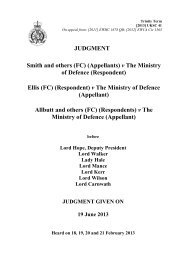
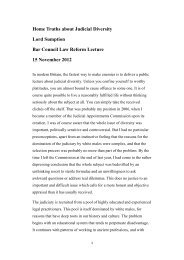
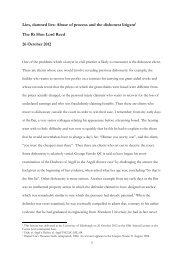


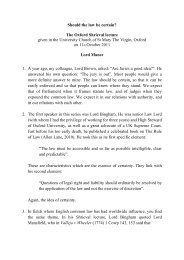
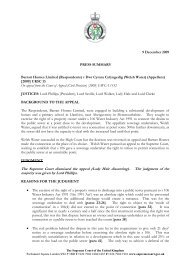

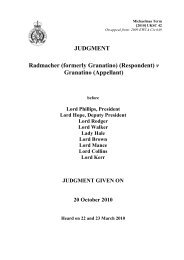
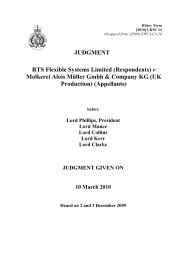
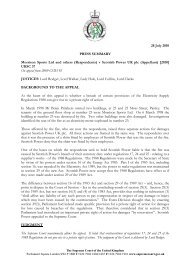
![[2009] UKSC 10 - The Supreme Court](https://img.yumpu.com/8582038/1/184x260/2009-uksc-10-the-supreme-court.jpg?quality=85)
